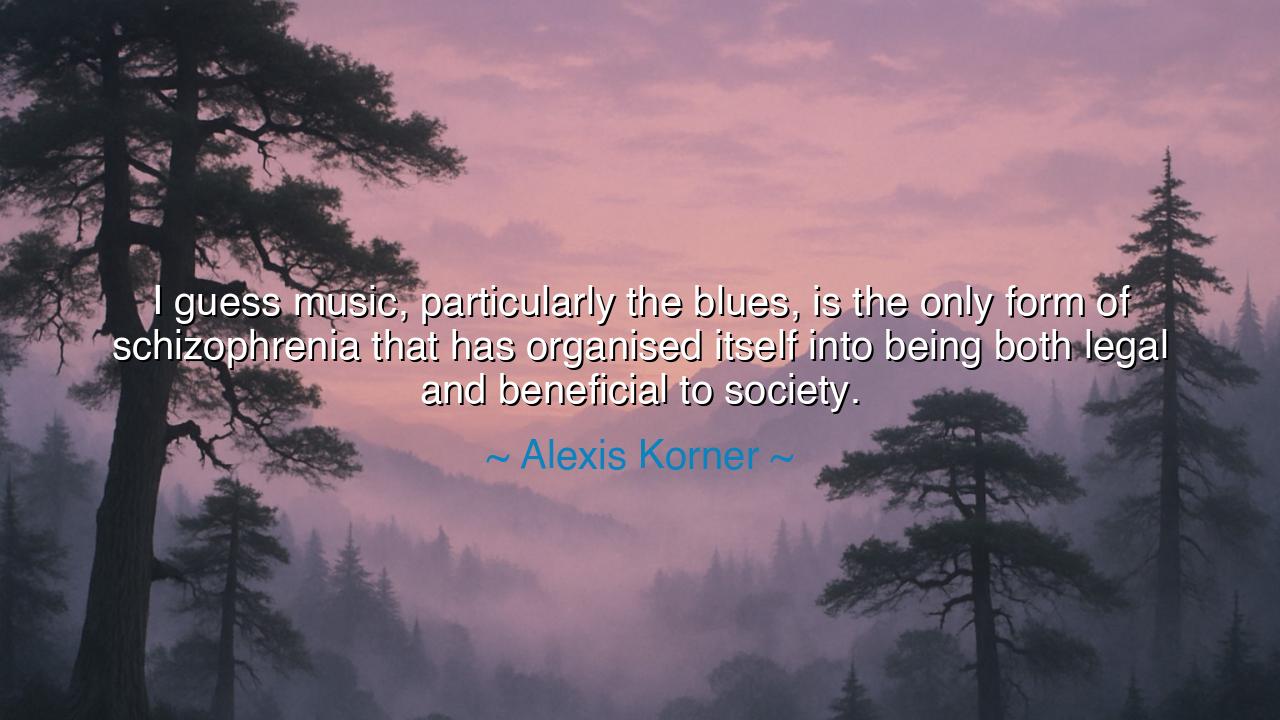
I guess music, particularly the blues, is the only form of
I guess music, particularly the blues, is the only form of schizophrenia that has organised itself into being both legal and beneficial to society.






In the words of Alexis Korner: “I guess music, particularly the blues, is the only form of schizophrenia that has organised itself into being both legal and beneficial to society.” At first, these words seem playful, even strange, but within them lies a deep well of truth. They speak of the power of music to hold contradictions together, to turn pain into joy, sorrow into strength, chaos into order. In calling it a kind of schizophrenia, Korner reminds us that music contains multitudes—it is at once personal and universal, destructive in its raw emotion and healing in its release.
The ancients knew that the soul is divided. Plato himself described music as the force that harmonizes the parts of the soul, binding reason, spirit, and desire into one. The blues, born from suffering, is the perfect embodiment of this truth. It carries the cry of anguish and yet transforms it into beauty; it tells of hardship but also provides release. To some, such paradox might seem madness, yet this “madness” is beneficial because it organizes chaos into rhythm, turning what could be despair into shared human understanding.
The blues itself has an origin steeped in struggle. It was born from the fields of the American South, where enslaved and oppressed peoples sang their sorrow into the air, creating something both haunting and powerful. The songs carried grief, but they also carried survival. What could have remained as silent suffering instead became melody and rhythm, shaping not only the lives of those who sang, but the future of all music. Out of brokenness came a creation that fed the soul of the world. This is what Korner means when he says music is both legal and beneficial—society embraced the art that grew out of anguish, and in doing so, healed itself.
Consider the tale of Robert Johnson, the legendary bluesman who was said to have sold his soul at the crossroads for his talent. His story, whether myth or truth, reveals the power of the blues: to touch something beyond the ordinary, to tap into the deep contradictions of human life. Johnson’s music was filled with longing, with shadow, with a restless spirit—but it gave rise to inspiration that changed generations. In his songs, we hear the schizophrenia Korner speaks of: pain and transcendence, despair and hope, all in one.
The deeper meaning of Korner’s words is this: the blues is not just music, it is a mirror of the human condition. Every man and woman carries within them contradictions, voices that clash, pains that overwhelm. If left unspoken, they can destroy; but when given form through art, they can heal not only the individual but the community. The blues takes what is fractured and makes it whole—not by erasing the fractures, but by weaving them into melody.
This is why music stands apart from other expressions of sorrow. Where silence breeds despair, song breeds communion. Where pain isolates, the blues unites. A person may cry alone, but when the cry becomes a blues song, it becomes part of a shared heritage, a collective strength. What could be madness becomes meaning. What could be destructive becomes creative. This is the paradox Korner marvels at: that music transforms inner chaos into outer harmony, a gift both to the one who plays and to the society that listens.
So let this teaching endure: when you feel divided within yourself, when sorrow presses heavy on your chest, do not let it remain silent. Give it form—through song, through words, through creation. For in expressing the contradictions, you transform them. Like the blues, your struggles may yet become a blessing, your pain a melody that others can share. And remember: the world does not heal through perfection, but through the honest beauty of broken things made whole.






AAdministratorAdministrator
Welcome, honored guests. Please leave a comment, we will respond soon